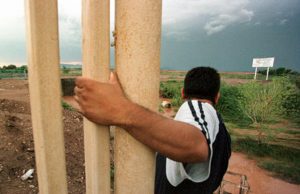“Unauthorized Immigration to the United Sates”, (2006)

IMM99081006 – 10 AUGUST 1999 – DOUGLAS, ARIZONA: A “coyote” or guide for illegal aliens hangs onto the end of the fence marking the US-Mexico border while he searches for signs of the US Border Patrol before leading a group of about 50 illegal immigrants into the United States near Douglas, Arizona, August 8, 2001. There has been an explosion in the number of illegal immigrants entering the US around Douglas, a small town on the US-Mexico in southeastern Arizona. In July, 1999, the Border Patrol apprehended 16,900 illegal aliens in Douglas, a town of 15,000. rlw/Jack Kurtz/File UPI
During the late 1990s and early 2000s, the US was attracting a significant number of immigrants who crossed their borders illegally. Most of those immigrants came from Latin American countries specifically Mexico, El Salvador, Guatemala, and Honduras. The rise in immigration resulted in US pressure to deal with the situation mostly on part of the Latin American nations. In January 2006, Mexico and the Central American nations with some representatives from the Dominican Republic and Colombia, gathered to come up with a resolution to deal with immigration internally and externally including the US. Some of their most important points were the importance of protecting the human rights of immigrants regardless of their location. They emphasized that if immigrants decide to move because of the lack of social or economic well being in their respective countries, they have the opportunity and right for a safe and legal migration that will benefit themselves and their host country. They also mention that the region should prioritize the fight against illegal trafficking and not label every migrant as criminals. This document shows that Latin American countries are willing to work with the US on reducing illegal immigration by not just promoting development changes.
“Chavez’s ‘Devil’ Remark and Global Protocol”, (2006) https://www.npr.org/templates/story/story.php?storyId=6111995?storyId=6111995
In 2006, Hugo Chavez Frias, the president of Venezuela, delivered a speech to the United Nations denouncing the US as an “imperialist” nation and even called George W. Bush the “devil”. Chavez always had opposite views from the US by supporting socialism, being a close ally of Cuba, and brining up “imperialism” a term ran out after the Cold War years. Chavez saw himself as the voice of the poor and as an advocate of Latin America against US intervention. In his speech, Chavez accused the US of imposing their influence over the Third World by not allowing Venezuela to be part of the Security Council. He never calls the US president by name but rather refers to him as the “devil” that allows all these abuses to happen. The commentary of his speech is worth mentioning too since it argues that his words used “breaches every element of diplomatic protocol”[1]. This means that Chavez doesn’t only call out the US in front of everyone but also losses diplomatic respect from other countries leaving him in uncomfortable position. Chavez’s speech and motivation can be traced way back to American intervention in Latin America. Some of his ideas are shared among Latinos evident through various popular elections during the 21st century. Latin American frustration lead to some of these countries to rise against the United States eventually some of these countries becoming tyrannical like Venezuela today.
[1] “Chavez’s ‘Devil’ Remark and Global Protocol.” All Things Considered, September 20, 2006. World Scholar: Latin America & the Caribbean (accessed May 6, 2019).
